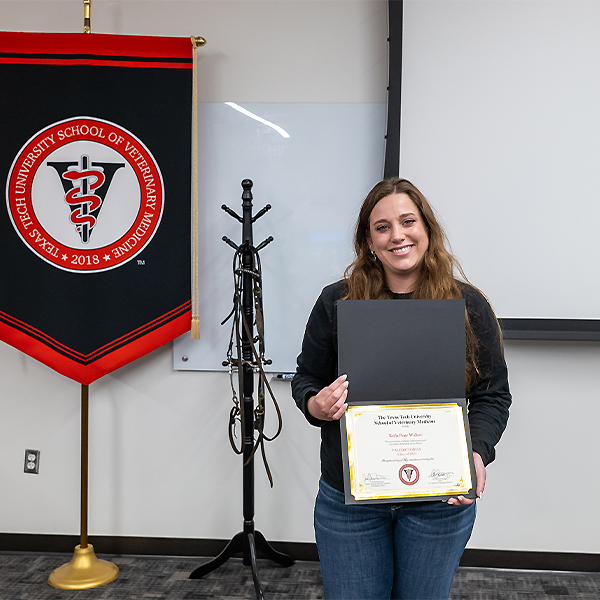
Dr. Kayla Wallace will serve rural and regional communities as the school’s first valedictorian.
On May 18, Kayla Wallace officially became Dr. Kayla Wallace during Texas Tech University’s School of Veterinary Medicine’s inaugural graduation. She was also the school’s first-ever valedictorian – an honor she’ll never forget.
“It’s the culmination of years of hard work, resilience and the unwavering support of my best friends, classmates and extraordinary community,” Wallace said. “It’s both humbling and deeply meaningful to be part of this historic moment for our school.”
Wallace grew up in La Grange, Texas, where her early exposure to agriculture began
by helping on her grandparents' small farm. However, there was one particular job
that sparked her pursuit towards veterinary medicine.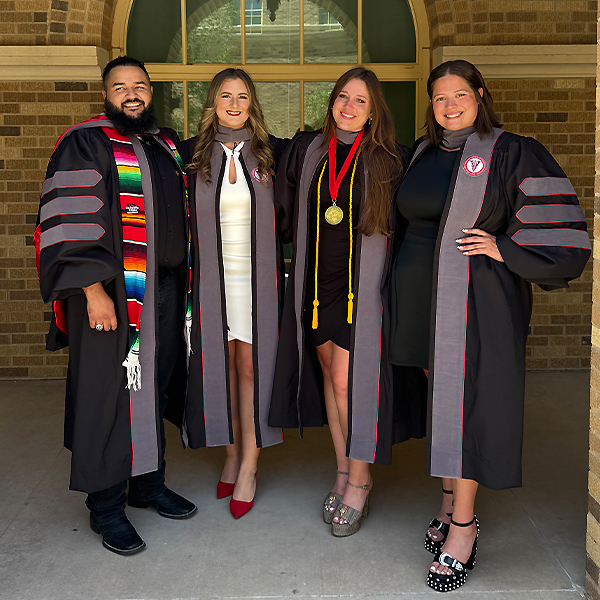
“It wasn’t until I started working at a local dairy farm at a young age that I truly became immersed in the world of agriculture,” Wallace said. “There, I gained hands-on experience in animal husbandry across a variety of species and developed communication skills by leading educational tours of the dairy.”
It was through this job she found a deep passion for the dairy industry. This began to shape her academic journey as she continued to work in the field through undergraduate research and ultimately earned her master’s degree focused in the dairy industry.
Combining her knowledge and skills she has learned over the past several years, she now heads to Hallettsville, Texas to serve the veterinary needs of rural and regional communities. Let’s get to know Kayla Wallace through a series of questions.
What are you passionate about in veterinary medicine?
When most people think of veterinary medicine, animals naturally come to mind first. While caring for animals is at the heart of the profession, the human connection is just as vital. For me, the true passion for veterinary medicine lies in serving people—providing care, support, and guidance to the community I’m a part of.
Growing up in a small town, I saw firsthand how deeply respected and relied upon veterinarians, doctors, and other professionals are. I aspire to be one of those trusted individuals and someone who not only treats animals but also strengthens the fabric of the community through meaningful relationships and dedicated service.
What inspired you to be a veterinarian?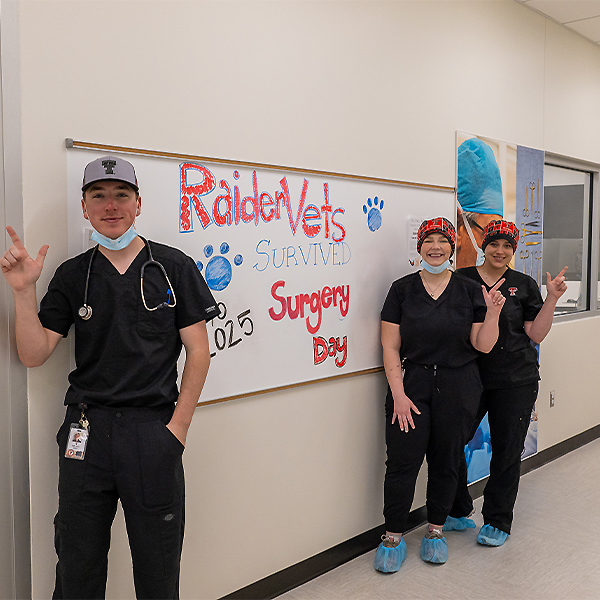
My interest in veterinary medicine first sparked during high school, thanks to my inspiring agriculture teacher, Mr. Klump. While I was gaining hands-on experience in animal husbandry and industry through my job, his classes helped me connect that practical knowledge with foundational concepts like animal anatomy, common diseases, and public health.
This blend of classroom learning and real-world experience fueled my curiosity and solidified my passion for animal science. It was this early inspiration that led me to pursue an animal science track in college and ultimately guided me to apply to veterinary school.
How do you plan serve the veterinary needs of rural and regional communities after graduation?
After graduation, I’m excited to begin my career as an associate veterinarian at Hallettsville Veterinary Hospital, a true mixed animal practice serving both small animals and cattle in equal measure. This opportunity perfectly aligns with my passion for both companion animal care and production medicine, and I’m eager to apply the skills I’ve gained throughout veterinary school to serve a diverse client base in a rural community.
How are you involved with the school?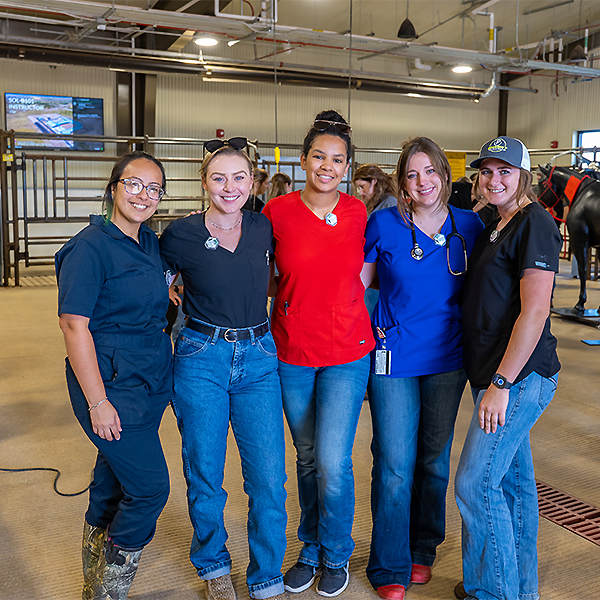
During my time at Texas Tech’s School of Veterinary Medicine, I made it a priority to stay actively involved in student organizations and professional development opportunities. I was honored to serve as the first American Association of Swine Veterinarians representative for our school’s food animal club. I also had the exciting opportunity to be part of the inaugural Texas Tech University Quiz Bowl Team at the American Association of Bovine Practitioners conference.
Additionally, I was a member of the school’s pathology club, where I further developed my diagnostic reasoning and deepened my understanding of disease processes. These experiences enriched my education, strengthened my leadership skills and helped build lasting connections within the veterinary community.
How was your clinical year experience?
My clinical year was an incredible journey filled with learning, growth and unforgettable experiences. I had the privilege of completing rotations across the state—from Amarillo to Freeport—where I’ve worked alongside exceptional veterinarians and built valuable professional relationships. Throughout the year, I’ve gained confidence in key areas such as surgery, internal medicine, diagnostics and client communication. I kicked off my clinical experience at Hallettsville Veterinary Hospital, initially drawn by the chance to be closer to home. What started as a convenient placement quickly became the place where I realized I wanted to begin my career.
No other rotation could match the adrenaline of late-night emergencies at Brock Veterinary Clinic, the insightful Taco Villa pathophysiology discussions with Dr. Sears at West Texas Veterinary Specialists, or the warmth and mentorship I received at Freeport Veterinary Medical Center. This year brought highs and lows, laughter and challenges—but every rotation taught me something invaluable, not only about veterinary medicine but also about the resilience of the profession itself.
How did the clinical year prepare you to be a better veterinarian?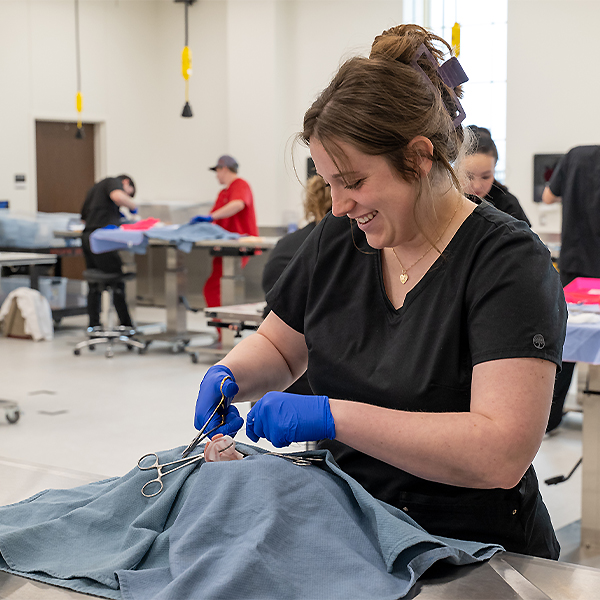
The disseminated clinical year model has given me the unique advantage of feeling as though I’ve already spent a year in the field. Immersed in real-world settings, I was exposed to the true dynamics of general practice—where clinical decision-making goes beyond textbook knowledge to include emotional and financial considerations. This hands-on experience not only sharpened my clinical skills but also deepened my understanding of the complexities and compassion required in everyday veterinary care.
Can you talk about your excitement for graduation?
I began my undergraduate studies at Texas Tech in 2018, which is the same year the creation of Texas Tech’s School of Veterinary Medicine was officially announced. I vividly remember the excitement that swept through the campus among students, faculty and staff. From that point on, I followed the development of the school closely, witnessing its progress unfold in real time.
My first visit to Amarillo was solely to see the empty lot where the veterinary school would eventually rise; construction hadn’t even begun. I was determined to earn a place in the inaugural class and committed myself to working hard to make that dream a reality. Now that I have graduated from the School of Veterinary Medicine, I’m filled with gratitude and pride. It’s incredibly rewarding to have been part of something so meaningful from the very beginning and to see how far we’ve all come.
